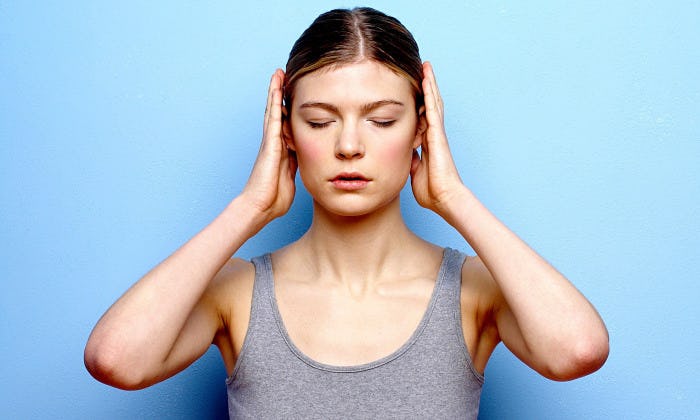Life

5 Easy Exercises That Can Help Reduce Depression & Anxiety
If you're dealing with depression or anxiety, perhaps one of the best things you can do to ease your symptoms is work up a sweat. According to the Mayo Clinic, exercise can greatly reduce depression and anxiety in individuals as it reduces stress, improves sleep and raises self-esteem levels. Getting active releases feel-good chemicals, endorphins, into the brain which reduce our perception of pain and releases positive feelings. They have similar effects on our brain as morphine, actually.
But the benefits don't stop when you're done sweating. A study published in the Journal of Neuroscience found that exercise, like running, can quiet down anxiety in the long run since it creates more excitable neurons in the brain, as well as more neurons that inhibit brain activity and reduce anxiety. The authors of the study also noted that active animals have more neurotransmitters in the hippocampus — the area of the brain thought to be the center of emotions, memory, and the autonomic nervous system — to process their emotions, which helps better deal with anxiety and depression.
In less scientific ways, exercise can also keep anxious and depressive thoughts at bay by simply providing a distraction and a chance for you to clear your head. When you're in the middle of a run or a Zumba class, chances are your mind won't keep racing back to the stressors of everyday life. Instead, you'll be focusing on the physical task at hand. Exercise also gives you an opportunity to set goals to work toward, which will help you feel better about yourself as you achieve them.
Now, this is not to say a sweat session will rid someone of depression and anxiety. But it may be able reduce them and make them easier to manage. And certain types of exercise may be even more beneficial to reducing anxiety and depression. These five workouts are extra great at leaving you feel calm, happy and ready to go.
1Running
You know the term runner's High? well, it's a legitimate thing. As the New York Times notes, Running releases a slew of endorphins to the brain, which leaves you feeling good while you're running, and once you've stopped clocking the miles. Research has even shown that running is just as effective as psychotherapy in the treatment of depression. And, most people find running a good way to clear the head, which can help you deal with high-stress levels and anxiety. So lace up your sneakers and get out there — even if you run for 10 minutes, it's better than staying seated.
2Yoga
It should come as no surprise that yoga is great for both the body and mind. Yoga focuses on breathing and slows down your entire system to dissolve stressors, leaving you feel calm and relaxed even hours after you've practiced. Another goal of yoga is to clear the mind and just focus on being present in the moment, which will help you stop stressing about the future or harping on the past.
3Dancing
Turn up the tunes and get your groove on! Dancing is not only a great aerobic workout, but it's also an effective way to boost your mood. (Seriously, when have you ever started dancing and not felt better afterwards?) Studies have found that dancing lowers levels of cortisol, the stress hormone, in the body and also lowers levels of depression. The combination of physical activity, music, and sensorial stimulus leave people feeling happier after we've shook our booties. Feel free to dance on your own to your favorite jams, or — even better — take a class. Learning a new type of dance requires you to be fully present in the moment, which will help keep your mind in a good place.
4Tai Chi

Similar to yoga, doing Tai Chi is a combination of using the mind and the body as one. By combining Chinese martial arts and meditation, Tai Chi balances and heals the mind and body through meditation, relaxation of the muscles and breath, physical balance and concentration. Practicing Tai Chi proves to be a wonderful way to alleviate adverse symptoms of depression and anxiety.
5Walking
Sometimes, when you're depressed or anxious, working out may be the last thing you want to do. But exercise doesn't mean going on a 5-mile run or taking an intense yoga class — it's about getting yourself moving. Walking is a good way to be active; you'll be moving and regulating your breath, which will give you all of the positive benefits of any exercise. And walking through nature might even be better than a different workout. Nature can reduce rumination — the process of feeling sad and not being able to stop thinking about why you're feeling this way. It also increases positive ones, as it is restorative and gives you both a sense of belonging and a sense of being away.
Being active makes you feel better in your body and better about yourself as you push through your fitness goals, all of which will help reduce anxiety and depression levels. No matter what exercise you choose to do to boost your mood, all that matters is that you do it.
Images: Xuân Giao Nguyễn/Flickr; Giphy (4); Wiffle Gif